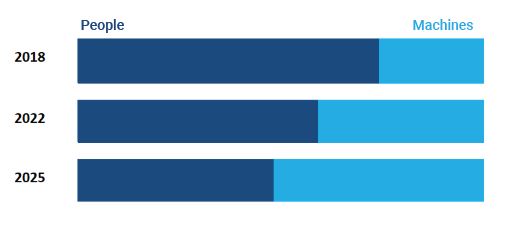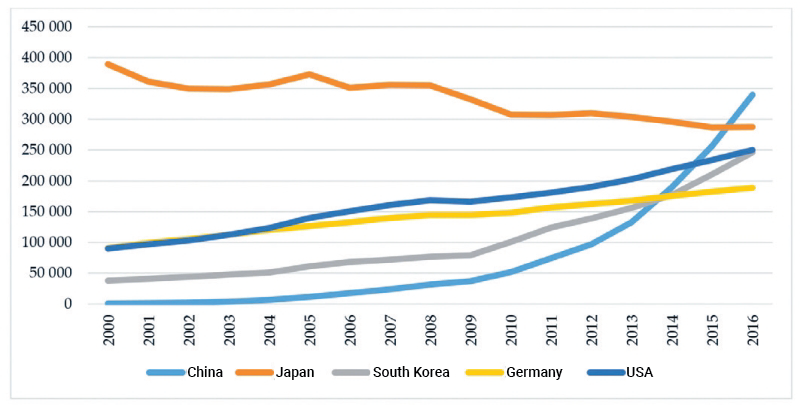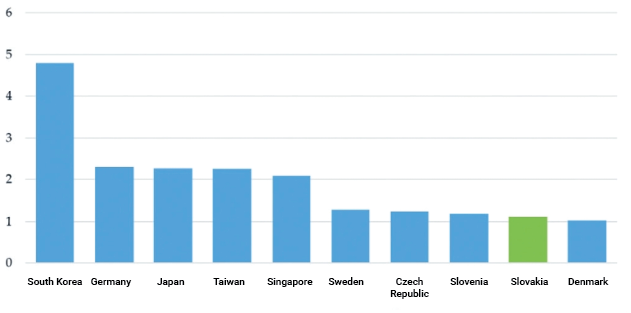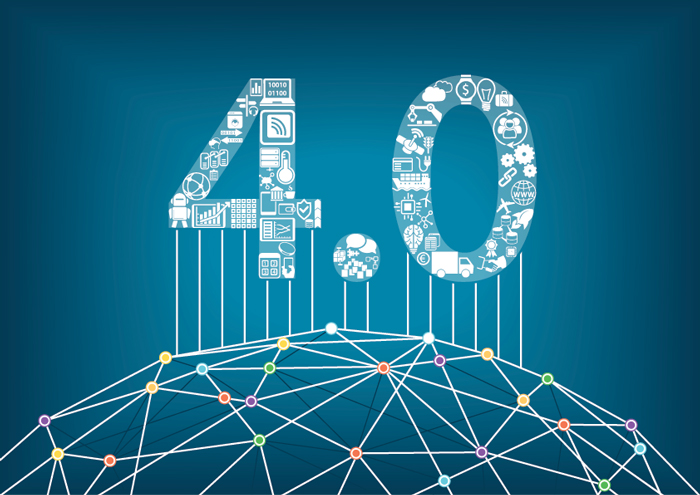Digitalization will change world of work and habits in the coming years. Although this change brings along number of risks for employers. According to a recent analysis it could bring also several opportunities. Is society ready for this?
The upcoming Industrial Revolution 4.0. will have a huge impact on the global workforce. Machines and artificial intelligence will increase their part in industry. It is expected that by 2025, the part of human labor will fall from 71 % to 58 %. What has happened in all technological revolutions in the past will happen again. The current one will only differ in pace and range unprecedented in history.
Man vs. Machine
The atmosphere on the labor market has change dramatically in recent years. Increasing robotization of production and services together with the expected onset of artificial intelligence is considered to be job killer and tool for intimidation workers. Flexible work can mean more work and can lead also to stress and health issues. Regarding this up to 78 % of respondents reported that digitalization increases their workload. They fear the increase of required productivity. Thats why coming industrial revolution 4.0 brings opportunities but also risks.

New technologies still create new opportunities in the labor market. Although 70 milions of positions will completely change or dissappear, an additional 133 milion new jobs are expected to be divided between machines and people. According to a survey almost 40 % of global companies assume that thanks to automatization and new technologies new job positions will be created and up to 60% of current jobs can be replaced by computers or robots. The Industrial Revolution 4.0 will have its winners who will profit from it but losers too.
“The future of work is in our hands and will largely depend on the political decisions of countries. According to these decisions, our ability to use potential of all these digital and technological changes and ability to cope with all obstacles depends whether we succeed or fail.”
– Organization for Economic cooperation and development
The leader of robotization is Germany.
The Internet is the basis of the industrial revolution. Tasks that are repetitive will take over machines and people will do creative jobs. Machine-to-machine communication at the factory should rapidly increase productivity and brings change in industry. The devices won´t be set up to perform a specific activity, but will adjust to different requirements. Adaptability of machines will engage customers in the production process. Elasticity of behaviour and use of devices will mean a rapid reduction of production costs.

If the robotization of production would destroy jobs, countries like Japan, South Korea or Germany would have to deal with apocalypic unemployment. Germany as robotics leader in Europe has currently the lowest unemployment rate for last 25 years although the number of robots in Germany has been growing above average. Factory of Siemens in the Amberg city is 75 % automated and human intervention is usually needed only during equipment installation and in coordinating some components of the production process. The result is rapid productivity increase and the probability of a defctive product is only 0.0000115%. Even Slovakia is one of the leaders in robotics and the number of robots used in our country is constantly increasing. At the same time, employment is also rising.

The growing trend in the use of robots in production has the potential to redraw map of global value chains. In the past, companies moved production from developed countries to developing countries with cheap labor. At the moment more and more individual examples of worldwide companies, as well as empiric studies, points to the fact that they are relocating production back to developed countries.
With artificial intelligence to a higher level
In order to ensure that current industrial revolution will continue in favor of industrialized countries, industrial enterprises, government oficials, scientists and social partners need to build initiatives similar to the successful industrial revolution 4.0. This global concept will be modernized by artificial intelligence, because this technology will be included in everything in the future. Including IT, manufacturing, operation of industrial factories, products and services. Industrial artificial intelligence can advance the industrial revolution 4.0 to a higher level.
“The tools o the digital business are spreading especially in car factories which urgently need flexibility, quick response to customer requirements, shorten production times, increased quality and efficiency. Every minute a new different model comes off production line which brings completely new demands on management systems at all levels. However, digital enterprise technologies are also gradually penetrating other sectors of manufacture.”
– Organization for Economic cooperation and development
Researchers from Mannheim university say that artificial intelligence threatens only 9 % jobs. On the other hand OECD survey says 14% and scientists from Oxford university in their document estimates that 47 % of jobs will be at risk of automatization. We can only guess how the latest artificial intelligence and robotic developments will affect labor market. Developments show that workers in the industry with lower level of education and usually with lower salaries are most exposed to automatization. According to the study by the OECD that does not include demographic variables 6%(Norway) to 33% (Slovakia) of jobs should be automated.







